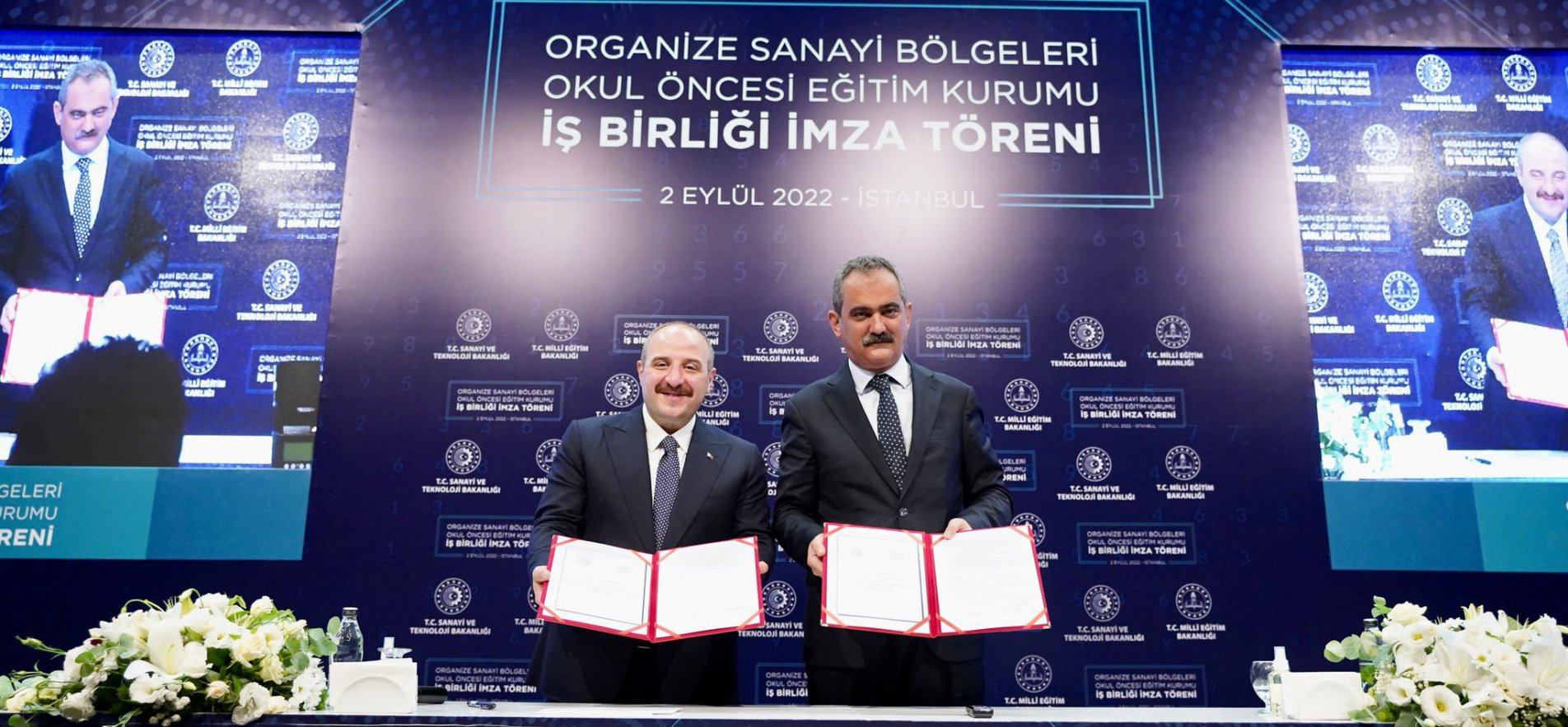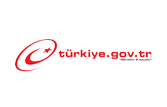COOPERATION PROTOCOL FOR PRESCHOOL EDUCATION INSTITUTIONS IN ORGANIZED INDUSTRIAL ZONES
Minister of National Education Mahmut Özer and Minister of Industry and Technology Mustafa Varank signed a Cooperation Protocol concerning the opening of Preschool Education Institutions in the Organized Industrial Zones.The Ministry of National Education and the Ministry of Industry and Technology have signed a cooperation protocol with the purpose of coordinating developments in the industry sector with the preschool education and disseminating preschool education services in the organized industrial zones in order to increase female employment.
Minister of National Education Mahmut Özer said that they had cooperated with the Ministry of Industry and Technology before about the inauguration of vocational education centers in the organized industrial zones.
Apprentices and foremen are needed especially in these zones where the majority of work owners are small and medium size enterprises.
"Vocational education centers are similar to the dual vocational education system in Germany. Students enrolled in these centers are going to centers once a day and they get training and have the chance to practice in real work environment during the rest of the week," stated Özer.
The number of apprentices and foremen reached to 700 thousand
Özer stressed that they have been carrying out campaigns required to provide equal opportunities in education to children in the last twenty year adding that all previous antidemocratic practices were lifted during this period.
"There were approximately 250 thousand apprentices and foremen in the vocational education centers in 1998 and this figure dropped to 74 thousand after the implementation of coefficient practice. While every country was working in an effort to increase the quality of their human resources, our education policies were based on just the opposite. As a result of our efforts in the last 20 years and after the amendment dated December 25, 2001 on the Vocational Education Law No. 3038, the number of apprentices and foremen reached from 159 thousand to 700 thousand. Our goal is to increase this figure to 1 million until the end of this year. We want to decrease young unemployment rates and use vocational education centers actively while reinforcing vocational education in the country," said Özer.
Noting that they have worked in effort to increase the quality of human resources which is the most permanent capital of a country, Özer stated that Türkiye has completed massificatio process with a 70 year long delay while OECD countries achieved this process in 1950s.
Özer went on to say that "In the 2000s, the schooling rate of five year old children was 11, schooling rate in secondary education was around 40 percent and schooling rate in higher education was 14 percent. Schooling rate of five year old children increased from 11 percent to 93 percent and the schooling rate in secondary education increased from 44 percent to 90 percent while the schooling rate in higher education increased from 14 percent to 48,5 percent."
Stressing that Türkiye has achieved to lift all antidemocratic practices in education in the last twenty years, Özer said that the number of students per teacher and classroom decreased during the same period.
He noted that despite the growth in the education system, they are based on quality based growth and Türkiye's grades in international student success surveys like PISA and TIMSS gradually increased in the recent year.
Özer also mentioned his Ministry's most important project concerning increasing preschool schooling rates.
"Despite important improvements in the schooling rates in primary, secondary, high school and higher education, the schooling rate of three to five year old children did not reach the desired level. We decided to focus on preschool education and initiated a project with the support of Emine Erdoğan in order to inaugurate 3 thousand new kindergartens and 40 thousand new preschool classrooms. We declared the beginning of the project in September 2021. We decided to open 1,000 of these new kindergartens in İstanbul. On that date, schooling rate of five year old children was 45 percent. We worked hard and till now we opened 1,407 kindergartens and prepared 10 thousand 200 new preschool classrooms for the new school year," said Özer.
Özer said that they will cooperate with the Ministry of Industry and Technology in order to open kindergartens in all organized industrial zones until the end of 2023.
"We are aiming at opening kindergartens in 100 Organized Industrial Zones"
Meanwhile, Minister of Industry and Technology Mustafa Varank reminded them that they had signed another cooperation protocol with the Ministry of National Education for twinning vocational education centers with the organized industrial zones.
Varank said that students are getting on the job training at the factories located at the industrial zones adding that education programs and materials of vocational education centers are improved and updated according to the needs of industry and the project allowed both Ministries the opportunity to raise the quality of labor.
"It is very important to maintain coordination between the industry and education in order to improve employment figures. Due to this reason, both Ministries will continue to work together. The new protocol aims at opening kindergartens in 100 organized industrial zones within a year. Of course, we will increase the number of these schools in the future. Expenses concerning lot, construction and furniture costs will be paid by the industrial zones under the coordination of our Ministry," noted Varank.
Teachers and school personnel at these kindergartens will be assigned by the Ministry of National Education. Kindergarten construction in the İkitelli Organized Industrial Zone still continues.
Varank went on to say that the new cooperation protocol will allow children to have access to quality preschool education while it also supports female employment.
"In 2002, there were 192 organized industrial zones in the country and this figure reached 341 today. We are providing employment to approximately 2,3 million people in these zones. Our new project will allow us to disseminate preschool education as well as improve employment rates," said Varank.



















